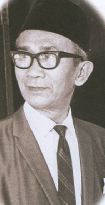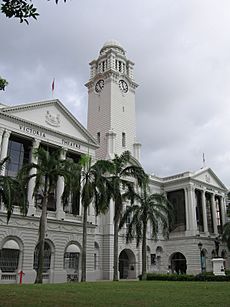Zubir Said facts for kids
Quick facts for kids
His Excellency Tuan Haji
Zubir bin Said
زبير بن سيد
Sijil Kemuliaan, BBM, JS, SKA, SBA, ACCA, COMPASS; (Lifetime Achievement Award) |
|
|---|---|

Pak Zubir, the composer of "Majulah Singapura", Singapore's national anthem
|
|
| Background information | |
| Birth name | Zubir Said |
| Born | 22 July 1907 Fort De Kock, Dutch East Indies (now Bukittinggi, West Sumatera, Indonesia) |
| Died | 16 November 1987 (aged 80) Singapore |
| Genres | Film scores and songs |
| Occupation(s) | Composer |
| Years active | 1928–1987 |
| Labels | Universal Music Group |
Zubir Said (born 22 July 1907, died 16 November 1987) was a famous Singaporean composer. He came from the Minangkabau highlands in Indonesia. He is best known for composing "Majulah Singapura" ("Onward Singapore"), which is the national anthem of Singapore.
Zubir Said taught himself music. He also worked for 12 years at Cathay-Keris Film Productions. There, he arranged music and wrote many songs for Malay films. People believe he wrote around 1,500 songs in his lifetime. However, less than 10% of these songs were ever recorded. Many people saw Zubir as a composer with a "true Malay soul." His songs often shared important messages about history and Malay wisdom. He and other musicians helped awaken a sense of national pride in the 1950s.
Contents
Early Life and Musical Beginnings
Zubir Said was born on 22 July 1907, in Bukittinggi, which was then called Fort De Kock. This town is in the Minangkabau highlands of West Sumatra, Indonesia. He was the oldest of eight children. His mother passed away when he was only seven years old.
He went to a Dutch school but was not very interested in regular schoolwork. His journey into music began when a teacher introduced him to the Solfa music system. A friend from primary school later taught him how to make and play a flute. In middle school, he learned to play the guitar and drums. He learned these instruments from his friends and from a keroncong music group he joined.
Moving to Singapore and Career
In 1928, when he was 21, Zubir moved to Singapore. He wanted to become a musician there. A sailor friend had told him that Singapore was a place of "glittering lights" and good food. His father, Mohamad Said bin Sanang, did not want him to go. His father believed music was against their religion.
Zubir's first job in Singapore was with City Opera, a Malay opera group called bangsawan. He soon became the leader of the group's band. In 1936, he joined the recording company His Master's Voice. In 1938, Zubir went to Java to marry Tarminah Kario Wikromo, who was a keroncong singer. They returned to Bukittinggi in 1941, just before World War II started.
After the war, in 1947, Zubir came back to Singapore. He worked part-time as a photographer for the Utusan Melayu newspaper. At the same time, he continued to compose and perform music. In 1949, he became an orchestra conductor at Shaw Brothers' Malay Film Production. Then, in 1952, he joined Cathay-Keris Film Productions. He worked there as a music arranger and songwriter for Malay films. Some of these films included Sumpah Pontianak (1958) and Chuchu Datuk Merah (1963). In 1957, his songs were performed at the Victoria Theatre. This was his first public recognition.
Composing "Majulah Singapura"
Singapore was a British colony at the time. In 1951, it was given city status by King George VI. In 1958, the City Council of Singapore asked Zubir to compose a song for the city. The song was to be called "Majulah Singapura". This phrase was a motto that would be shown in the Victoria Theatre after it was renovated.
Zubir's song, "Majulah Singapura" ("Onward Singapore"), was first played on 6 September 1958. It was performed by the Singapore Chamber Ensemble at a concert. This concert celebrated the official reopening of the Victoria Theatre.
When Singapore gained self-government in 1959, the government needed a national anthem. They wanted a song to bring all the different people in Singapore together. They decided that the City Council's song, which was already well-liked, would be perfect. After some small changes, the song was officially adopted on 11 November 1959. On 3 December, "Majulah Singapura" was presented to the nation. It replaced the old colonial anthem, "God Save the Queen".
After Singapore became fully independent from Malaysia on 9 August 1965, "Majulah Singapura" was formally made the national anthem of the Republic. In an interview in 1984, Zubir explained his idea behind the anthem. He quoted a Malay saying: "Di mana bumi dipijak, di situ langit dijunjung." This means, "You should respect the land where you live."
Later Life and Legacy
In 1962, Zubir's songs for the movie Dang Anom won an award. This was at the Ninth Asian Film Festival in Seoul, South Korea. He continued to work for Cathay-Keris Film Productions until he retired in 1964. He wrote many songs for Malay films during this time.
He also gave music lessons. Other musicians often visited him to talk about music and ask for his advice. His youngest daughter, Dr. Rohana Zubir, remembers their home always being full of music. She said her father loved to share his wisdom so others could learn from him. He was also very generous. He helped his family in Sumatra and other families in Singapore. He sent them medicine and other things, even when his own family did not have much.
Zubir said that he was never motivated by money. He believed money was important for living and taking care of his family. The money he earned from teaching music and composing for films was enough for him. He valued honesty and being true to himself in his work. He cared a lot about purity and originality in his music, lyrics, and singing style. He stopped writing songs for the film company when he was unhappy. The company decided to save money by using old music for new films.
Zubir passed away on 16 November 1987, at the age of 80, in Singapore. He left behind four daughters and one son. In 1990, a book called Zubir Said: His Songs was published. It told the story of his life and his love for music. In 2004, a bronze statue of Zubir was placed in the Malay Heritage Centre. This center honors important figures in Malay arts and culture.
Awards and Recognition
Zubir Said received many awards and honors from Singapore and other countries. These awards recognized his huge contributions to Malay music and to Singapore.
- In 1963, he received the Sijil Kemuliaan (Certificate of Honour).
- In the same year, he was given the Bintang Bakti Masyarakat (Public Service Star).
- In 1971, he received the Jasawan Seni (cultural medallion) award.
- In 1987, he received the Asean Cultural and Communications Award.
- He also got a Certificate of Commendation for composing a song for the Amalgamated Union of Public Employees (AUPE).
- In 1995, after his death, he received a Lifetime Achievement Award from COMPASS (Composers and Authors Society of Singapore).
On 8 May 2009, it was announced that the address for the School of the Arts (Sota) would be 1 Zubir Said Drive. This was done to honor the great composer.
His Music and Influence
Zubir is most remembered for creating Singapore's national anthem, "Majulah Singapura" ("Onward Singapore"). The Malay words of the song encourage Singaporeans to "progress towards happiness together." They also say that their "noble dreams bring Singapore success." The song calls for everyone to "unite in a new spirit."
In 1956, he also sent three songs to the Malayan government. He hoped one would be chosen as their national anthem. However, a different song, "Negaraku", was chosen instead.
Zubir is also known for his song "Semoga Bahagia" ("May You Achieve Happiness"). This song was written for primary school students. It advises them to work hard for their future. It has become a popular Children's Day song in Singapore. It is often sung in schools on 1 October and performed during the Singapore Youth Festival.
It is thought that Zubir wrote about 1,500 songs. Many of these were for Malay films in the 1950s and 1960s. Only a small number of these songs were ever recorded. On 22 August 2007, Zubir's family signed an agreement with Universal Music in Malaysia. This agreement allows Universal Music to manage his musical works. The copyright for the songs still belongs to his family. His daughter, Dr. Rohana, said she wanted to ensure his songs continue to be loved by young artists.
People often say Zubir had a "true Malay soul." His songs were a mix of traditional and modern styles. They were also very patriotic. His music often included historical messages and traditional Malay wisdom. A journalist named A. Samad Ismail said that Zubir and other Minangkabau artists helped create a strong sense of national identity in the 1950s.
Works
- (in Malay).
See also
 In Spanish: Zubir Said para niños
In Spanish: Zubir Said para niños
 | Kyle Baker |
 | Joseph Yoakum |
 | Laura Wheeler Waring |
 | Henry Ossawa Tanner |


